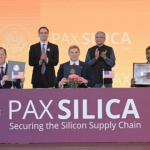As we step into the future, one thing is certain—artificial intelligence (AI) is becoming as indispensable to our daily lives as electricity. Tech Trends 2025 explores the transformative forces shaping tomorrow’s technology landscape, with AI emerging as the unifying thread across industries and innovations.
This year’s trends highlight the growing influence of AI in both business and personal spheres, the emergence of spatial computing, significant hardware advancements, and evolving priorities in cybersecurity and core modernization.
AI is no longer just a feature—it’s the foundation of most modern innovations. Looking ahead, AI will be deeply embedded into everyday life, quietly optimizing urban traffic systems, personalizing healthcare, and enhancing educational experiences. From generative AI to compact language models, the emphasis is shifting toward selecting the right technology for each task, fundamentally changing how we live and work.
Another key trend is spatial computing, which is transforming the way people interact with digital information. By dissolving data silos and creating immersive experiences, this technology is enabling more intuitive engagement for both businesses and consumers. With the aid of AI, spatial computing is becoming increasingly predictive and responsive to user needs.
Hardware innovation is also accelerating, driven by AI’s intensive computing demands. From AI-embedded chips in personal computers to energy-efficient processors, these advancements are paving the way for next-generation robotics and IoT systems—particularly in sectors like healthcare, where precision and speed are critical.
AI is reshaping the business of technology as well. IT departments are being transformed, with generative AI enabling streamlined infrastructure, automation, and increased efficiency. Organizations are adopting leaner, more agile systems to meet rising demands with fewer resources.
Cybersecurity remains a top concern. As quantum computing becomes more viable, traditional encryption methods may soon be at risk. Companies must proactively transition to post-quantum encryption standards to safeguard digital communications and data integrity.
Core modernization—the process of reengineering enterprise systems with AI—continues to evolve. AI-driven processes are becoming more intelligent and adaptive, helping businesses increase agility and predictive capabilities. However, these advancements also require technical expertise and careful management to avoid added complexity.
Tech Trends 2025 underscores a future where deep innovation and broad transformation intersect. By strategically combining technologies, industries can unlock new opportunities, accelerate growth, and prepare for a fast-evolving digital landscape.
For MSMEs and startups, these insights are especially valuable. Embracing AI and spatial computing can streamline operations, enhance customer engagement, and improve decision-making. By integrating AI into products and services, startups can develop smarter solutions and remain competitive. Investing in scalable hardware and modernized infrastructure will also help future-proof operations and reduce long-term costs.
In a world of constant change, staying ahead of technology trends is crucial. With the right strategies and tools, businesses—regardless of size—can harness innovation to drive progress and seize new growth opportunities in the digital era.










